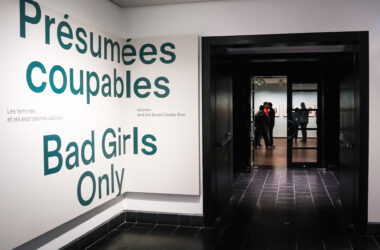Content warning: The following deals with discussions of sexual assault and death.
Words with Will is an annual theatre workshop hosted by Repercussion Theatre Company that explores William Shakespeare’s works through a critical lens. Each year, playwrights are invited to personally engage with Shakespeare and his texts, as well as debut their new projects. This year, Works with Will took place from March 2 to 4 on Facebook Live and showcased the plays Black Fly, created by Omari Newton and Amie Lee Lavoie, and Wardo, created by Jimmy Blais.
On the first evening of the three-day event, Repercussion’s Artistic and Executive Director, Amanda Kellock, led a roundtable discussion with the playwrights to talk about their upcoming projects and their relationships to Shakespeare’s work.
Black Fly co-creator Omari Newton noted that his frustration with Shakespeare’s portrayal of BIPOC characters inspired him to write an adaptation of Titus Andronicus. Co-creator Amy Lee Lavoie was also dissatisfied with the lack of agency and dialogue that Shakespeare gave his female characters compared to their male counterparts in the original play.
In their adaptation, Newton and Lavoie shift the focus away from the Romans and place the attention on the play’s victimized characters, allowing them to gain restitution. Aaron, who plays a minor role in the original play, is a protagonist in Black Fly, and notably speaks in verse with a hip-hop cadence.
Newton elaborated on why he felt it was important to use hip-hop in this adaptation.
“I came into Shakespeare [… and] immediately felt a connection to acting in verse because I was a big hip-hop fan,” Newton said. “Part of my work as a writer […] is to make the establishment recognize that urban art forms are as impressive and as worthy of study and reverence as classic works.”
In the original play, the character Lavinia is sexually assaulted, mutilated, and then left mute for the rest of the show. In Black Fly, Lavinia regains her voice, which allows her the opportunity to condemn her perpetrator.
During the event’s third evening, Jimmy Blais, the creator of Wardo, discussed how his relationship to Shakespeare as a form of colonialist art inspired him to write Wardo.
“I fell in love with Shakespeare at a young age […] but later in life I started to question Shakespeare’s position in my life, and I started to see it as an abusive relationship in some ways,” Blais said. “It’s hard to get away from the fact that it’s […] a cultural flag for colonialism.”
Inspired by the activists who protested the Coastal Gaslink pipeline on Wet’suwet’en lands in 2020, Blais strived to express his frustrations with the RCMP’s treatment of Indigenous people through art, and chose Shakespeare as his target.
Wardo is the story of an Indigenous teen, Dylan, who ends up in the home of a Shakespeare-loving family after spending much of his youth in the foster care system. The play explores how Dottie, Dylan’s foster mother, has good intentions in teaching her children Shakespeare, but ultimately falls short in recognizing the colonialism embedded in the playwright’s work.
In the scene that Blais showcased at Words With Will, Dottie takes Dylan and his foster brother to Parliament Hill to roast marshmallows. While playing with a stick, Dylan is tragically shot and killed by RCMP officers, jolting both the play’s characters and its audience back to the reality of the systemic racism that oppresses Indigenous peoples in the Canadian justice system.
When Blais discussed his play, he explained his reluctance to rework an existing Shakespeare text.
“I didn’t want to do it within Shakespeare’s frame,” Blais said. “There’s a big part of me that’s conflicted, but […] in doing Shakespeare in any form, I am perpetuating this colonialist art [….] I feel like at this point in my career […] I am done doing Shakespeare because of the time and space and resources that we still give it still to this day […] and the only way for me to cut ties with it is to burn it down.”









